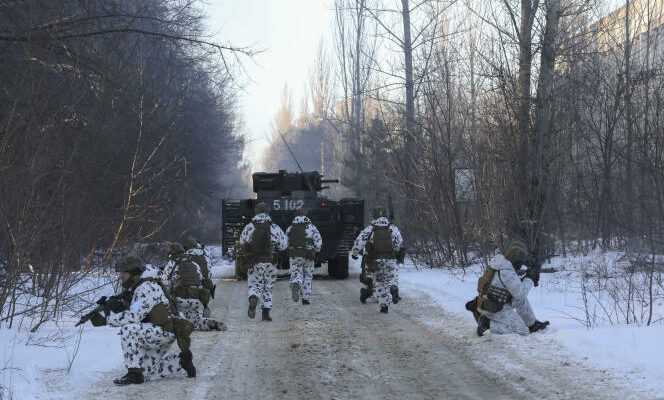The Chernobyl plant has not been occupied by Russian troops since Thursday, March 31, according to Ukrainian authorities. “There are no more foreign people (in the service) inside the Chernobyl nuclear power plant”site of the worst civilian nuclear disaster in history, the Ukrainian state agency Energoatom said on Facebook.
During their occupation, the Russians engaged in “looting of premises, theft of equipment and other valuables”, charged the agency. Ukrainian specialists will now inspect the plant in search of potential “explosive devices”according to the same source.
“As they left the Chernobyl nuclear power plant, the Russian occupiers took with them members of the National Guard whom they had been holding hostage since February 24”, the agency later said on Telegram, citing employees. It is not known how many Ukrainian soldiers were “held hostage” by Russian forces.
Discussions between the IAEA and Russia
The International Atomic Energy Agency (IAEA) has confirmed that the transfer of responsibility to Ukrainian authorities has been formally noted “in writing”. The body had ceased, since March 9, to receive live data from Chernobyl. She worried Sunday about the lack of staff turnover at the plant since March 20.
Its managing director, Rafael Grossi, landed Thursday evening in Kaliningrad, Russia. He is scheduled to discuss there on Friday 1er April on nuclear safety in Ukraine with senior Russian officials. Earlier in the week, the diplomat visited the Yuzhno-Ukrainsk power plant in southern Ukraine, where he met with government officials and staff.
According to a press release, this trip aims to set up “concrete measures to provide urgent technical assistance” in this country endowed with a vast nuclear fleet, ie fifteen reactors in four power plants in operation, as well as several nuclear waste repositories. Mr. Grossi planned to hold a press conference on his return to Vienna, the headquarters of the IAEA, on Friday afternoon.
A reactor at the Chernobyl power plant exploded in 1986 contaminating much of Europe but especially Ukraine, Russia and Belarus. Dubbed the exclusion zone, the territory within the radius of 30 kilometers around the plant is still heavily contaminated and it is forbidden to live there permanently. Its last operational reactor was closed in 2000. The damaged reactor, covered with a tight steel cover and containing highly radioactive magma, is constantly monitored by specialists. Two nuclear fuel storage centers are also located in the exclusion zone.
